
Have you ever wondered why VPN apps have become so popular, or why businesses are rushing to invest in them? That’s because online privacy and security have become top concerns for both individuals and businesses in today’s digital world.
But here’s the burning question: How much does VPN app development cost?
The cost of building a VPN app varies based on features and security measures, ranging from $3,500 for a basic app to over $40,000 or more for an advanced solution.
As we head into 2026, the demand for VPN services grows, so does the competition. Building a VPN app isn’t a small feat. It requires careful planning, skilled development, and an understanding of the costs involved. If you’re planning to enter the VPN app market or expand your existing business with a custom app, knowing what you’re up against financially will help you make better decisions.
In this guide, we’ll break down the factors that influence the cost of developing a VPN app, provide insights into different types of VPN apps, and help you understand the steps to build your app while staying within your budget. Let’s dive in.
VPN (Virtual Private Network), has become a tool for safeguarding online privacy and ensuring secure internet connectivity. And whereas, a VPN app serves as a secure channel between your device and the internet.
But how does it work? It encrypts your internet traffic and reroutes it through a server in a location of your choice. Moreover, it secures your data from hackers and snoops and masks your IP address. Thus, it makes your online activities virtually untraceable.
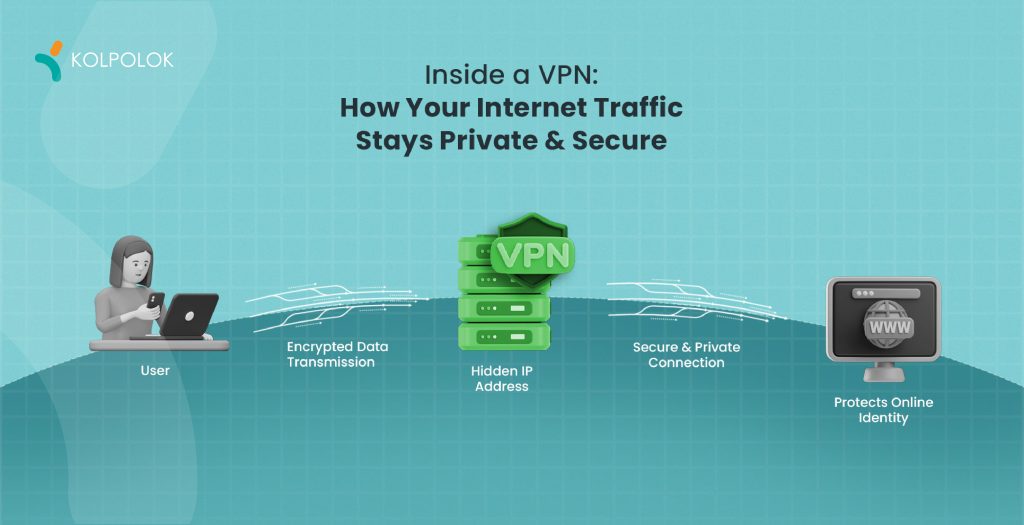
With cybersecurity threats rising, VPN apps have evolved from niche security tools into mainstream essentials for both individuals and businesses.
Are VPNs just for tech geeks? Far from it. Today, the VPN industry represents a multi-billion dollar sector with massive growth potential. The global VPN market was valued at $45 billion in 2022 and is projected to reach $350 billion by 2032, according to Statista.
With the right business strategy, startups and enterprises can capitalize on this booming market and establish a long-term, profitable business.
The growing demand for VPNs is driven by more than just privacy concerns:
Investing in VPN app development is a big opportunity in a fast-growing market. With rising privacy concerns and fewer digital boundaries, demand for VPN services is higher than ever. According to a report of The Business Research Company, the market is projected to grow from $61.42 billion in 2024 to $71.66 billion in 2026, at a CAGR of 16.7%. By 2029, the market is expected to reach $154.09 billion with a CAGR of 21.10% .
Here’s why the VPN market is booming and why it’s a great business opportunity:
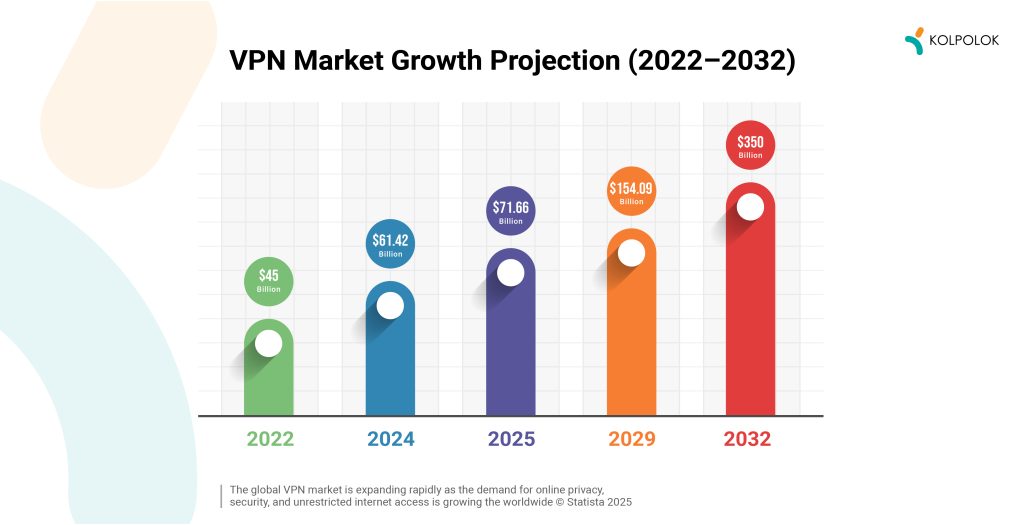
Massive Demand for Online Privacy
Bypassing Geographical Content Restrictions
Corporate Security & Remote Work Revolution
Growth of Private & Decentralized Browsing
Unlike many software niches, VPN services come with some unique aspects. Having its own high-quality VPN app can be a transformative move for startups and a strategic expansion for established tech companies. This field offers big profits, it also gives you the flexibility you need to stand out in the tech world.
The question is not if the VPN industry will grow, but how fast and how businesses or companies can take advantage of this growth. Now, let’s talk numbers, how much does it VPN app development cost?
As the demand for VPN services booming, so does the need for well-developed apps that meet user expectations. The VPN app development cost in 2026 is influenced by factors like app complexity, advanced security features, chosen protocols, and the location of your development team. These variables can significantly impact your investment, which will vary depending on the features you choose. Below is a quick cost breakdown for different types of VPN apps:
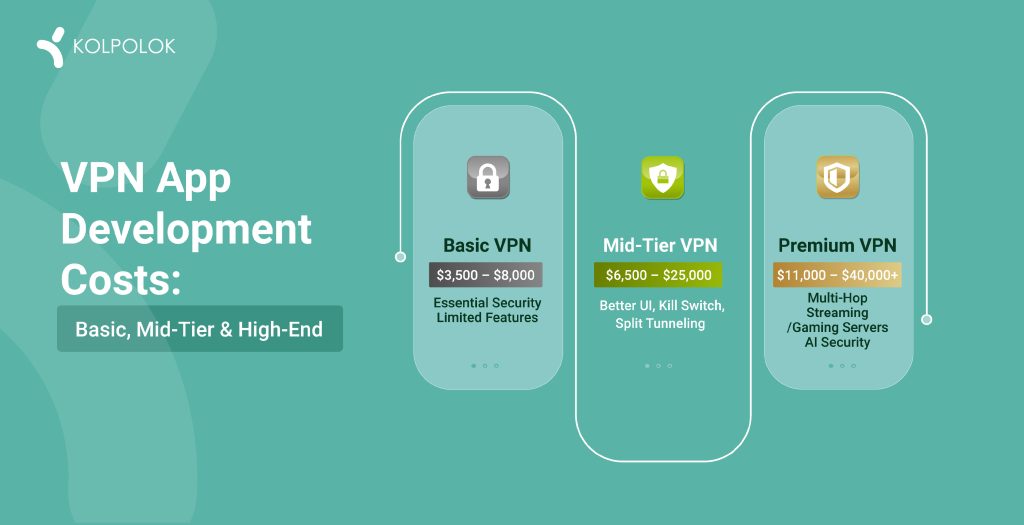
| VPN App Type | Features | Estimated Development Cost | Time to Build |
| Basic VPN App | – Simple UI – Secure encryption – 3–5 server locations – Basic UI – Comprehensive backend solution with an admin panel and API integration – Standard testing | $3,500 to $8,000 | 1–2 months |
| Mid-Tier VPN App | – Enhanced UI/UX design – Advanced features (kill switch, split tunneling) – 10–20 server locations – Strong backend, API integration – Comprehensive testing | $6,500 to $25,000 | 2–3 months |
| High-End VPN App | – Premium UI/UX design – Advanced encryption protocols – 50+ server locations worldwide – Multiple devices support (iOS, Android, Windows, macOS) – Ad-blocking functionality – Backend solution with admin panel and and API integration – Integrated push notifications and more – Gaming/streaming servers- Custom DNS | $11,000 to $40,000 or more | 3–6 months (or more) |
Choosing the right features for your VPN app is important. Not just for user experience it also helps to determine VPN app development cost. Some features are essential, ensuring the app functions securely and efficiently, while others are advanced, offering enhanced functionality but increasing development expenses.
In this section, we’ll explore must-have VPN features that form the core of any VPN application, along with premium features that can set your app apart in a competitive market.
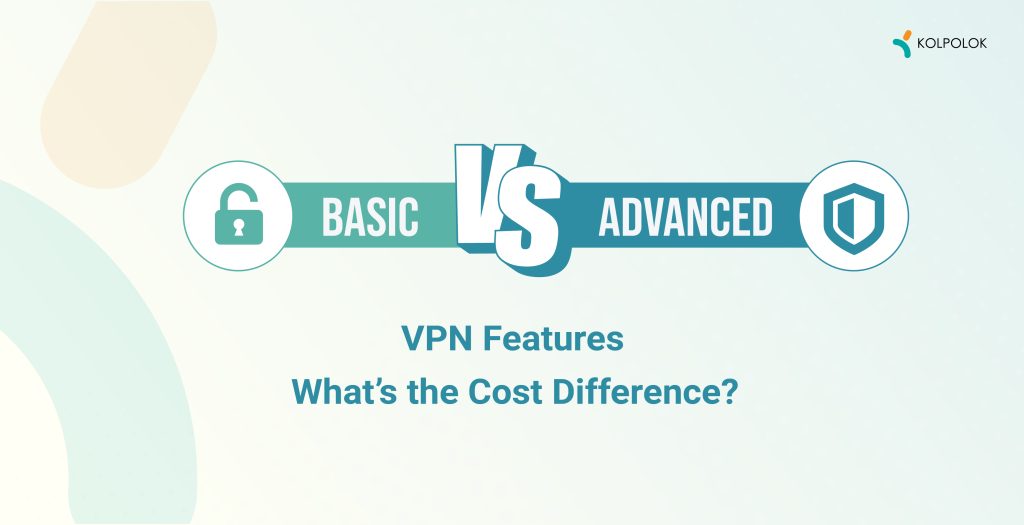
These features are the backbone of any VPN application, ensuring basic functionality and security:
These advanced features can significantly enhance user experience and the app’s functionality, but they also come with a higher price tag.
| Feature | Basic App Cost (USD) | Mid-Tier App Cost (USD) | High-End App Cost (USD) |
|---|---|---|---|
| Secure Encryption (AES-256, WireGuard, OpenVPN, etc.) | $1,000 to $2,000 | $1,500 to $2,500 | $2,000 to $3,000 |
| Multiple Server Locations & Load Balancing | $500 to $1,000 | $1,500 to $2,500 | $3,000 to $5,000 |
| No-Logs Policy & User Data Privacy Compliance | $300 to $700 | $800 to $1,200 | $1,200 to $2,000 |
| Kill Switch | $200 to $500 | $500 to $1,000 | $1,000 to $1,500 |
| Cross-Platform Compatibility (Android, iOS, Windows, macOS, Linux) | $1,500 to $3,000 | $3,000 to $5,000 | $5,000 to $8,000 |
| Split Tunneling | – | $1,000 to $2,000 | $1,500 to $2,500 |
| Multi-Hop VPN | – | $1,500 to $2,500 | $2,500 to $4,000 |
| Ad-Blocking & Malware Protection | – | $500 to $1,000 | $1,000 to $2,000 |
| Gaming & Streaming-Optimized Servers | – | $2,000 to $4,000 | $4,000 to $6,000 |
| Smart VPN | – | $500 to $1,000 | $2,000 to $3,000 |
Note:The costs are estimated and can vary based on market averages, development region, team expertise, and specific project requirements.
By now, you probably understand that many factors affect the VPN app development cost. Besides the features, these factors are important for planning your budget and managing the project. Let’s take a closer look at each one:
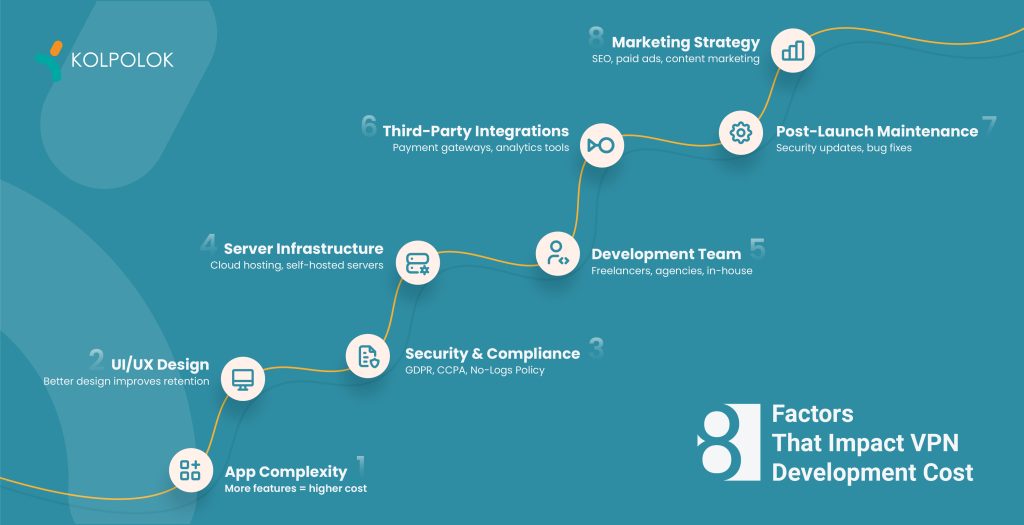
The features of your VPN app are the single most important factor in determining the overall cost. Basic apps require fewer features and simpler infrastructure, while advanced apps need more sophisticated security and performance enhancements.
| App Complexity | Estimated Cost |
| Basic VPN App (Essential Features) | $3,500 – $8,000 |
| Mid-Tier VPN App (Advanced UI/UX & Additional Features) | $6,500 – $15,000 |
| Premium VPN App (High-End Security, AI Features, Custom Servers) | $11,000 – $30,000+ |
2. Design & User Experience (UI/UX) Investment
No one wants to use an app that’s clunky or hard to navigate. Choosing the best UI/UX design solution provider can impact the cost of development. While simple designs may cost less, investing in a more polished, user-friendly interface to attract and retain users.
If you want your app to stand out in a crowded marketplace, the design must be intuitive, clean, and easy to use. You may also want to include customizable themes or unique elements to enhance the overall look and feel, but this will drive up the cost.
| UI/UX Complexity | Estimated Cost |
| Basic UI/UX | $2,000 – $3,000 |
| Custom UI with Advanced UX | $3,500 – $5,000+ |
A VPN app is useless if it doesn’t guarantee privacy & legal compliance. VPN security features like encryption, kill switch, and compliance with privacy laws add to development costs. Ensuring compliance with regulations such as GDPR and CCPA requires additional resources.
| Security Features | Estimated Cost |
| Basic Encryption & Security | $3,000 – $5,000 |
| Advanced Security & Compliance | $5,000 – $7,000+ |
Servers are the backbone of any VPN app. The infrastructure required to support multiple server locations worldwide can be expensive. Besides the initial setup costs, you’ll also need to consider ongoing server maintenance and updates.
The more locations your app offers, the more servers you’ll need, increasing both initial and ongoing costs. You’ll need to plan for:
You’ll also need to think about the long-term costs for maintenance, including security updates, bug fixes, and any new features that need to be added after launch.
| Hosting Type | Estimated Cost (Per Month) |
| Cloud Hosting (AWS, Google Cloud, DigitalOcean) | $500 – $2,500 |
| Dedicated Servers (Full Control) | $1,500 – $5,000 |
The experience, skill level, and location of your development team will also influence costs. Hiring expert developers will cost more, but their expertise ensures a smoother development process, better security implementation, and an overall higher-quality product.
Elancers offer affordable VPN app development service but may lack the full-stack expertise required for a high-quality result.
Also, you can consider partnering with a VPN app development agency that specializes in VPN solutions. As they can provide better scalability, project management, and security compliance.
| Region | Freelancer Rate | Agency Rate |
| USA & Canada | $80 – $150/hour | $100 – $200/hour |
| Western Europe | $60 – $120/hour | $80 – $180/hour |
| Eastern Europe | $30 – $60/hour | $50 – $100/hour |
| India & Southeast Asia | $20 – $50/hour | $40 – $80/hour |
| Latin America | $25 – $60/hour | $45 – $90/hour |
6. Third-Party Integrations
Adding third-party services such as payment gateways, analytics, and customer support tools improves user experience but increases VPN App Development Cost.
| Integration Type | Estimated Cost |
| Basic API Integrations (Payments, Analytics) | $1,000 – $3,000 |
| Advanced Integrations (AI Chatbots, Support Tools) | $3,000 – $5,000 |
Before you launch your app, you need to test it thoroughly to ensure that everything works smoothly. Bug testing, performance testing, and security testing are essential. This can take anywhere from a few weeks to a couple of months, depending on the complexity of your app.
Keep in mind that testing is an ongoing process, especially when you’re releasing updates or adding new features. The quality assurance process ensures that your app is secure, fast, and bug-free, which is key for user satisfaction.
| Testing Type | Estimated Cost |
| Basic Functional Testing | $1,500 – $4,000 |
| Performance & Load Testing | $2,000 – $5,000 |
| Security Testing (Penetration Testing) | $3,000 – $8,000 |
| Automated Testing Setup | $2,000 – $6,000 |
| Ongoing QA for Updates | $500 – $2,000/month |
Building a VPN app is important, but getting users to find and download it is just as important. Here’s a breakdown of key marketing strategies and their costs. Costs can include paid advertising, search engine optimization (SEO), and content marketing strategy. Each strategy comes with its own set of costs and potential returns on investment.
| Marketing Strategy | Estimated Cost |
| SEO, Content Marketing | $5,000 – $10,000 |
| Paid Ads | $10,000 – $20,000+ |
Developing a VPN app involves multiple stages. Each of these ensures the final product is secure, user-friendly, and effective. Here, our expert VPN solution providers shared a comprehensive step-by-step guide, complete with estimated timelines for each phase of the development process. This detailed roadmap will help you understand what it takes to bring a VPN application from conception to launch.
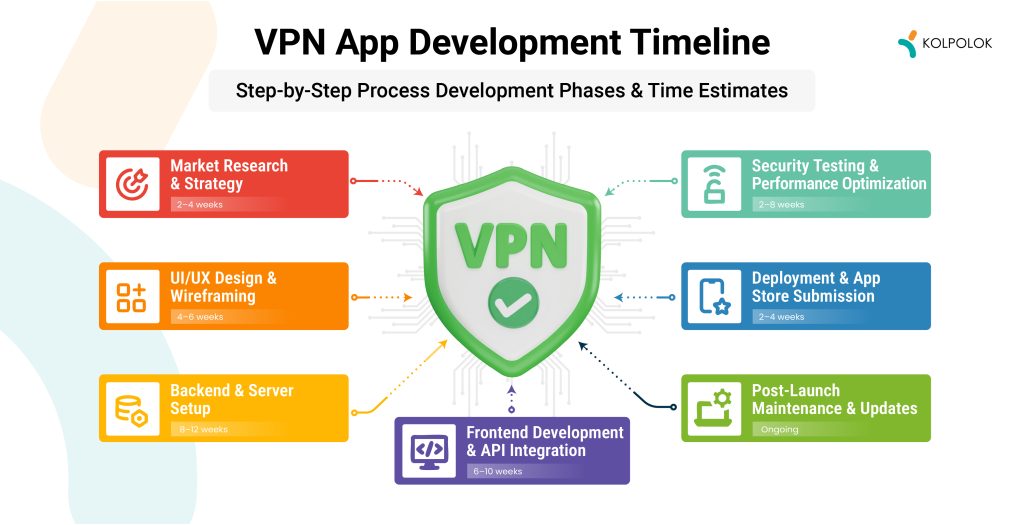
Before you even think about coding, take a step back and understand the market. Building a VPN app without research is like setting sail without a map. You might move forward, but you won’t know where you’re headed.
This isn’t about copying, it’s about finding opportunities they’ve missed. Maybe they lack budget-friendly plans, unique security features, or a smooth mobile experience.
For example- gamers, businesses, and privacy-conscious users have very different expectations. So, knowing your audience helps you design an app they’ll actually want to use and pay for.
✔ Do they need ultra-fast servers for gaming?
✔ Are they looking for an affordable but secure option?
✔ Do they want an easy way to bypass content restrictions?
✔ Subscription-based plans (monthly, yearly, or lifetime) → Most profitable long-term
✔ Freemium model (basic features for free, premium upgrades) → Good for acquiring users quickly.
✔ One-time payment/lifetime license → Works well for niche audiences but limits recurring revenue.
Think long-term. As for offering a freemium VPN, you’ll need a strong reason for users to upgrade to paid plans. For instance- faster speeds, more locations, or premium security features.
Pro Tip: Include a clear no-logs policy in your terms of service and be transparent about how you handle user data. People won’t trust a VPN that’s vague about its security policies.
Design isn’t just about looks, it’s about feeling and function. When you start working on the UI/UX, remember, your app’s interface is the first impression users will get. A clean, appealing, and easy-to-navigate design is important not just for enticing users to download the app, but also for ensuring they keep using it.
The backend is what makes your VPN app actually work. You can call it, the powerhouse behind the curtain. It handles user authentication, encryption, server connections, and data routing. Without a secure and scalable backend, your VPN won’t function effectively.
The frontend is the face of your VPN app, where users directly interact with the technology. Here, performance and usability are paramount to ensure that the app is not only functional but also enjoyable to use.
VPN security is non-negotiable. VPNs are trusted by users to safeguard their online activities.
Once your app has been tested and refined, your VPN app is ready for official release on app stores and websites.
App store submission:
Marketing & pre-launch campaigns: Implement a strategic marketing plan involving SEO, PPC, and influencer marketing to build buzz and attract early users. Effective pre-launch marketing can set the stage for a successful launch.
Post-launch is not the end of the road but the beginning of ongoing management and improvement.
Scaling infrastructure: As your user base grows, scale up your infrastructure by adding more servers and enhancing the overall speed and performance of the app.
| Development Stage | Estimated Time | Estimated Cost |
|---|---|---|
| Market Research & Business Strategy | 2 – 4 weeks | $2,000 – $5,000 |
| VPN App Design | 4 – 6 weeks | $5,000 – $15,000 |
| Backend & Server Setup | 8 – 12 weeks | $10,000 – $25,000 |
| Frontend Development & API Integration | 6 – 10 weeks | $15,000 – $30,000 |
| Security Implementation & Testing | 4 – 8 weeks | $5,000 – $12,000 |
| Deployment & App Store Submission | 2 – 4 weeks | $1,000 – $3,000 |
| Post-Launch Support & Feature Expansion | Ongoing | $1,000 – $3,000/month |
Note: The costs are approximations and can vary based on the development team’s location, the complexity of the app, and the specific features implemented.
Building a VPN app is just the first step. The real challenge? Turning it into a profitable business. The VPN industry is highly competitive, so choosing the right monetization model is important to attracting and retaining users while maximizing revenue.
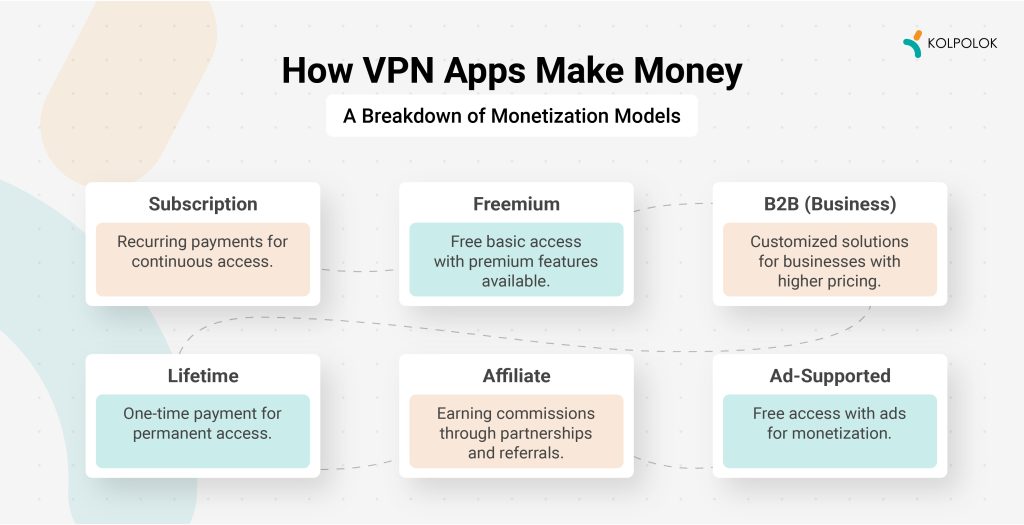
In this section, we’ll explore proven monetization strategies used by successful VPN companies to help you find the best approach for your app.
Users pay a recurring fee to access your VPN service. This model can include different tiers (e.g., Basic, Plus, Premium) offering varied features.
Companies like Symlex Layer, ExpressVPN and NordVPN thrive on this model, offering monthly, 6-month, and annual plans. These services emphasize enhanced security features, multiple device support, and high-speed servers as premium benefits that justify the subscription cost.
Pros:
✅ Steady, predictable revenue stream.
✅ Easier to scale and retain long-term users.
✅ Can offer discounts to increase lifetime value (LTV).
Cons:
❌ Harder to acquire users initially compared to free models.
❌ Needs strong customer support & feature updates to prevent churn.
A “freemium” VPN allows free access but limits speed, data, or server locations. Users can then upgrade to a premium version that includes additional features such as advanced security, faster speeds, or additional server locations.
ProtonVPN uses this strategy effectively by offering a free version with limited speed and server locations. Then users are encouraged to upgrade to access higher speeds and more servers.
Pros:
✅ Low barrier to entry → More users.
✅ Encourages upgrades based on user experience.
Cons:
❌ Free users consume server resources, increasing costs.
❌ Monetization depends on a strong conversion funnel.
Instead of subscriptions, customers pay once to get lifetime access to your VPN services. Priced significantly higher than annual fees. Used by some VPN service providers as limited-time promotions such as Black Friday.
These special sales events to boost short-term revenue and attract users looking for cost-effective solutions.
Pros:
✅ Fast high upfront revenue.
✅ Simplified subscription management.
Cons:
❌ No recurring revenue, constant need for new sales.
❌ Potentially hurts long-term profitability and sustainability.
❌ Lifetime, definition can be ambiguous (company lifetime vs. user lifetime).
❌ May signal potential long-term service quality issues due to lack of consistent income.
Offer customized VPN solutions to businesses, to meet their specific security needs and scales. This could include enhanced security protocols, dedicated servers, and management tools. The VPN app development cost for B2B solutions is often higher due to these customizations, but the potential return on investment is also greater.
Cisco is more like enterprise-grade VPNs integrated with their networking infrastructure, suitable for large businesses needing high data protection. And Perimeter 81 focuses solely on business VPNs, partnering with startups, enterprises, and remote teams. Higher per-user pricing.
Pros:
✅ Higher revenue per customer.
✅ Long-term contracts.
Cons:
❌ Enterprise-level infrastructure and dedicated support.
❌ Longer sales cycles.
You can earn commissions by partnering with other businesses. Promoting other companies’ services or receiving a fee for directing users to streaming services or internet service providers.
Many VPN services partner with content creators and tech bloggers who recommend their service, offering affiliate links that provide commissions for every subscriber referred.
Pros:
✅ Low overhead costs (no need for extra infrastructure).
✅ Easy to scale with influencer marketing and referrals.
Cons:
❌ Revenue depends on third-party success (less control).
❌ Requires strong brand reputation to attract partners.
Some VPNs offer free services but display ads to generate revenue. However, this model can compromise privacy and hurt trust if not done correctly. So, this requires balancing ad placements to ensure they don’t overly disrupt the user experience.
The VPN app development cost may be lower for ad-supported models, but long-term revenue and user trust are important aspects.
A free ad-supported version has been popular among users who prefer free VPN services despite the ads. Then they offer to purchase the premium subscription to remove ads so they can enjoy premium features.
Pros:
✅ Attract a massive user base and generate significant ad revenue
✅ Monetizes free users effectively.
✅ Doesn’t require direct payments from users.
Cons:
❌ High risk of privacy concerns (selling user data is a dealbreaker).
❌ Less profitable than subscriptions or B2B sales.
| Monetization Strategy | Estimated Revenue Potential | User Impact | Longevity | Best For |
| Subscription-Based | High | Positive (if priced fairly) | High | Privacy-focused users, businesses, and frequent travelers who need long-term security. |
| Freemium with Paid Features | Medium to High | Neutral to Positive (depends on balance) | Medium | Casual users, mobile users, and those wanting to test before purchasing. |
| One-Time Lifetime License | Medium (depends on market reach) | Positive | Low (one-time revenue) | VPN startups looking for a quick cash injection, best when combined with other models. |
| B2B Solutions | Very High | Highly Positive (adds business value) | High | Corporate security, remote teams, and IT departments. |
| Affiliate Marketing & Partnerships | Low to Medium | Neutral | Medium | VPN apps with strong branding & marketing strategies. |
| Ad-Supported Model | Medium to High | Negative (can be intrusive) | Low to Medium | Casual users in developing markets, but requires careful implementation. |
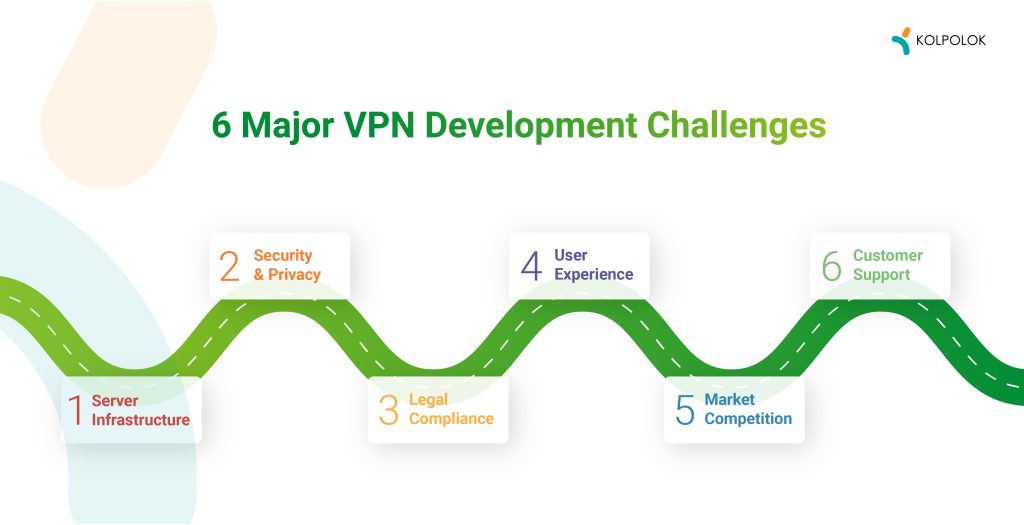
Developing a VPN app comes with challenges, from infrastructure setup to regulatory compliance. By tackling these challenges proactively, you can build a secure, user-friendly, and competitive VPN app that stands out in the market.
Here are six key obstacles you’ll face, and the best ways to solve them.
Challenges:
Solutions:
Challenges:
Solutions:
Challenges:
Solutions:
Challenges:
Solutions:
Challenges:
Solutions:
Challenges:
Solutions:
The VPN industry isn’t slowing down, it’s evolving. As cyber threats grow and internet restrictions tighten, the demand for secure, private, and unrestricted access is higher than ever. Building a VPN app today isn’t just about launching a product; it’s about creating a trusted service that users rely on daily.
By now, you understand what sets a VPN apart in a crowded market, security, adaptability, and seamless user experience. Long-term success comes from continuous innovation, smart monetization, and building trust with your users.
At Kolpolok, we specialize in VPN solutions that are secure, scalable, according to your business needs. Our VPN applications deliver military-grade encryption, seamless cross-platform performance, and customizable features. With the right planning, a solid team, and a clear vision, your VPN app could be the next big thing in the industry.
You’ll need a development team (or skills yourself) to build the app, server infrastructure (or use a cloud provider), and handle legal/compliance aspects. Consider using existing libraries and APIs for VPN protocols. Start with a basic version and iterate based on user feedback.
Common programming languages for VPN app development include Python, C++, Go, Java, and Swift, depending on the platform (Android, iOS, Windows, etc.) and performance needs.
Yes, but it’s competitive. Monetization models include subscriptions, freemium (free tier with paid upgrades), and potentially partnerships. B2B VPN solutions can also be lucrative.
The cost to build a VPN app typically ranges from $3,500 to $30,000+, depending on features, design, security, and platform.
Key features of a VPN app include secure encryption, kill switch, multi-platform support, a wide server network, no-logs policy, and speed optimization.
Building a VPN app can take anywhere from 3 to 12+ months, depending on complexity, features, and the development team’s expertise.
Subscription-based models (monthly/yearly) are the most common and profitable. Whereas the freemium or lifetime licensing options are also being popular.
Top VPN protocols to use in 2026 include WireGuard, OpenVPN, and IKEv2, due to their security, speed, and efficiency.